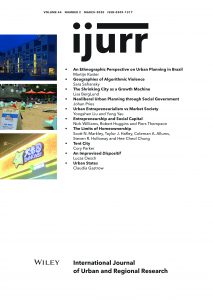Neoliberal urban governance is often framed as a break with the social statecraft of the postwar period. If we approach social government as a specific mode of biopolitical population politics, neoliberal reforms can instead be understood as re‐articulating the welfarist version of postwar social planning. In this article, I analyze how social urban government can become the basis of neoliberal planning through a study of the Swedish city of Malmö, which has shifted its approach from emblematic Scandinavian social democratic welfare urbanism to a particular kind of neoliberal planning. Malmö is a city where distinctions between desirable and unwanted populations are produced by municipal social planning that concerns itself with accumulating human resources. Postwar social planning technologies are thus re‐articulated as the basis for making space competitive for certain residents. This mode of planning is described as a type of ‘social neoliberalism’, which, instead of circumscribing neoliberal economics, extends the reach of neoliberalism into social government. This study suggests that calls for a return to social planning need to be complicated by accounts of how social government itself has been remade by neoliberal reforms. It also points out how the divisions produced by social neoliberalism expose powerful fault lines that reveal a terrain of political struggle.

